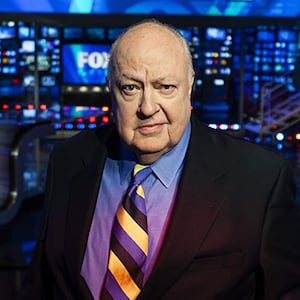Bombshell, the star-studded new movie about Roger Ailes’ downfall, doesn’t let anyone off the hook. Not even Megyn Kelly.
Bombshell isn’t necessarily a good film about Fox News, but it’s at least a fitting reflection of the mess wrought by the right-wing network over the past several years.
Directed by Jay Roach (Game Change, Trumbo) and premiering this Friday, Bombshell is a heavily abridged retelling of the downfall of Ailes, the conservative media titan and alleged serial sexual harasser, told from the perspective of three women who helped expose his misdeeds: former hosts Gretchen Carlson (Nicole Kidman) and Megyn Kelly (uncannily performed by Charlize Theron), and a fictionalized composite junior Fox News staffer played by Margot Robbie.
The film is unsparing in its depiction of the network’s culture (publicly misogynistic), its founder and boss (piggish), and the employees who turned a blind eye to his misdeeds (complicit). And though she has emerged a hero in the Ailes saga, the movie gets one key point right about Megyn Kelly: Hers is a complicated legacy as both victim/whistleblower and bombastic culture-war bomb-thrower. But, unfortunately, the movie is too often like the news channel itself—reductive, overly simplistic, bizarre, and at times infuriating and difficult to watch.
Bombshell is the latest in a series of political media-focused films and television shows trying to capture awards-season buzz by reflecting on our peculiar moment. The parallel filmmaking of the Obama era—the true-life paranoid whistleblower biopics, ultra-serious gumshoe investigative deep-dives, and saccharine revisionism about how journalists really Do The News—seemed quaint and dated the moment results began coming in on election night 2016.
In their place, and in the wake of the MeToo era, Hollywood has largely turned its eye to the darker world of Fox News and the cable-news industrial complex that played a large role in both creating and enabling Trumpism and in shaping the president’s own decision-making.
Bombshell follows the release of The Loudest Voice, a Showtime mini-series about Fox News, which mostly just followed a literally larger-than-life Russell Crowe ranting at other characters through various important moments in Ailes’ life. And HBO’s Shakespearean prestige drama Succession, which focuses on a fictional media conglomerate and conservative TV news network run by a mercurial aging media mogul and his bumbling failsons, has reportedly left Rupert Murdoch and family—from whom the show draws inspiration—less than enthused. Meanwhile, Apple’s flagship streaming TV show, The Morning Show, is about the drama, dysfunction, and sexual harassment of a morning TV gabfest.
The film tackles similar topics: abusive men, sleazy media opportunists, conservative grifters—and how this cocktail of TV fixtures seems related to Trump’s rise even in instances where it doesn’t directly correlate.
At well under two hours, with three moving storylines, there’s little time to delve deep into the characters—the movie barely even tries.
Crucial characters, as a result, get inexplicably boring beats. Despite her crucial role in the story, Kidman’s turn as Carlson is surprisingly flat. By the time she first appears on-screen, Carlson has shed her earlier image as the infamously anti-LGBTQ culture warrior she cultivated over a decade at the network. In the film, she’s now the voice of reason at Fox News, speaking out against guns and patriarchal television standards, and has already made up her mind that she’ll eventually need to reveal her experience with Ailes. The film gives her little to do beyond sitting with her lawyers and staring lovingly at her children.
Tangential characters, meanwhile, get the Saturday Night Live treatment. Star cameos portraying Rudy Giuliani, Geraldo Rivera, and Sean Hannity are brief, inconsequential, and less comical than they aspire to be. Other characters have potential to fill in the narrative about working at Fox News, but ultimately feel half-baked. A closeted queer woman and Hillary Clinton supporter working on Bill O’Reilly’s show, played by Kate McKinnon, has several of the movie’s more interesting scenes, but ultimately just feels like a deeply underexplored stand-in for the average behind-the-scenes types who had to work in the same offices as some of the most notorious TV blowhards.
In The Big Short, writer Charles Randolph used a mish-mash of genres and styles to playfully explore complex and difficult-to-explain topics. He fares worse running a similar playbook here. The combination of news montages, breaking the fourth wall, and occasional narration is disorienting and serves little purpose other than to sleek up the depiction of a miserable work environment.
The movie is saved more by the traps it doesn’t fall into.
Bombshell is not in love with Ailes’ dark cable television genius, an element of his personality that many of his former employees still feel the need to share despite his gross misdeeds, and that made The Loudest Room almost feel at points like a backwards homage to such a media ogre.
There’s little of the Showtime series’ near-reverential obsession with the late CEO’s ability to hack deep into the paranoid psyche of aging Americans. Here, Ailes’ worldview and conspiratorial delusions are played more effectively for laughs, while the scenes of his predatory behavior are uncomfortable and repulsive enough to eclipse any redeeming moments that would make him a “complicated” figure.
Though sources close to Kelly told The Daily Beast she’s seen and enjoyed the film, Bombshell doesn’t spare the former host from its critical lens. Though ultimately it was her decision to break with Ailes that tipped the scales against him, the movie goes out of its way to remind viewers that Kelly is not some infallible hero. Roach and crew do not let us forget that this is the woman who breathlessly fearmongered about the New Black Panthers and dedicated a primetime segment to arguing that Santa Claus, a wholly fictional character, could not possibly be black.
Bombshell doesn’t let us forget that Kelly attempted to quash her very public beef with Trump by conducting a transparently softball interview with the ascendant presidential candidate. It doesn’t forget the women who were hurt because of Kelly’s and her colleagues’ complicated decision to stay quiet about Ailes for years. And it doesn’t erase the fact that while Carlson remains without a mainstream television job, Kelly departed Fox for an even more lucrative television deal at NBC—though that, too, would soon fall apart.
Crucially, the film also doesn’t absolve all of the other anchors who either remained silent or staunchly and publicly defended Ailes in the wake of serious, serial harassment allegations.
The movie splices Theron’s Kelly and Kidman’s Carlson into real clips of Fox News anchors making gross jokes about women on live television, a reminder (in case it wasn’t obvious) that some of the perpetrators of the boys club are still some of the most prominent personalities on Fox News (here’s looking at you, two-thirds of the Fox & Friends couch). It reminds viewers that not only did Ailes get public support from prominent right-wing hosts like former anchor and current Trump Jr. girlfriend Kim Guilfoyle (who was later also pushed out following harassment claims) and outspoken Trump ally Jeanine Pirro, but also from other more moderate, ostensibly news-focused hosts like Neil Cavuto and Bret Baier.
Ultimately, of course, stories about Ailes’ downfall are complicated. Without the paranoid leader, who died following his departure from the network, the cable news channel has leaned even further into his vision of a conservative network to blot out the influence of mainstream media. And while a number of employees have departed Fox News following sexual harassment allegations, the network still proudly defends many alleged perpetrators and even employs some men credibly accused of sexual harassment.
But Bombshell gets one thing kind-of right: There are very few clear-cut heroes in this story.








